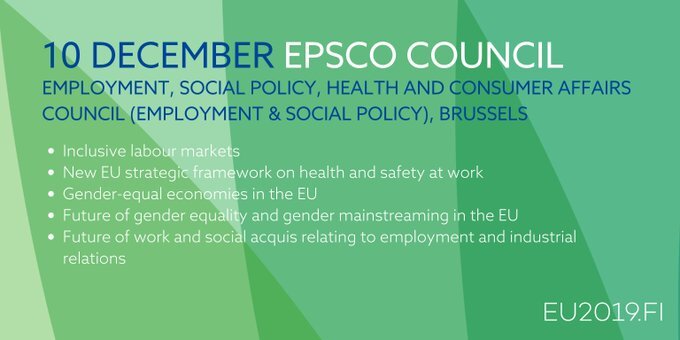Taken from our European partner, ENSIE: http://www.ensie.org/blog/2019/12/20/the-epsco-council-adopted-conclusions-on-nbspimproving-the-employment-of-people-in-a-vulnerable-position-in-the-labour-marketnbsp
On the 10th December, the EPSCO Council, gathering the Ministers responsible for Employment, Social Affairs, Health and Consumer Policy from all EU member states, adopted very important Conclusions on “Improving the employment of people in a vulnerable in the labour market”. It is the first time that the Council acknowledged at such scale role to integration of vulnerable people on the labour market in order to achieve a “higher overall employment rate, social cohesion and inclusion”.
First of all, ENSIE is pleased that the Council recognized the importance of Social enterprises: “Social enterprises can play a vital role in sustainable job creation and in facilitating social integration.” The Council, in order to reinforce this sector called to improve its framework conditions, such as its legal environment, access to finance and develop its visibility. For ENSIE, this would be a step in the right direction. In our Memorandum we called for the development of a positive European framework and message of Social enterprises and more especially Work Integration Social Enterprises (WISEs) at the EU level. This is particularly needed for the countries where WISEs do not exist yet or are underdeveloped.
Secondly, the Council proposed to assess “existing skills, identifying upskilling and reskilling needs, enhancing recognition and validation of existing knowledge and skills, providing career guidance and counselling and providing professional rehabilitation and reasonable accommodation for persons with disabilities”. This corresponds to one of ENSIE requests in its memorandum: recognizing skills, in particular in the context of non-formal training provided by WISEs and to facilitate the professional integration of vulnerable groups. Furthermore, ENSIE embraces the demand to promote tailor made training, to facilitate continuous learning and to step up efforts to implement the Recommendation on Upskilling Pathways. This is particularly needed in a context of digitalization, and the Council noted that it should benefit to all and that measures should be put in place to “counter existing inequalities”. Indeed, in our Memorandum, we call for an adaptation of policies on digitalization in order to promote innovation and inclusion.
We also welcome the Council recognition of the importance that “Public authorities can enhance the employment of different groups of people in a vulnerable position in the labour market by implementing social considerations and in particular employment criteria in public procurement processes.” This year, ENSIE participated to the Buying for Social Impact, project which conducted a study and showed the importance of responsible public procurement and, in particular, social considerations in public procurement and their impact on Social enterprises ecosystems. Making Public Procurement more social is a good way to strengthen the sector and ENSIE is working with its members in this direction. A European framework supporting this action is needed, in particular to support a better implementation of the 2014/24 directive on Public Procurement.
Another important point is the recognition of the importance of the European Social Fund (ESF) “to reach and help those in a vulnerable position with a view to their inclusion both in the labour market and in society, for example through the promotion of social innovations and through the implementation of multi-sectoral initiatives.” The support for this Fund even more important because the next Multiannual Financial Framework is under discussion and that we need to mobilize to ensure that the amounts available in the next ESF+ (European Social Fund +) are at least equivalent to those of the last programming period. A mobilization is also needed to ensure that this ESF+ has targeted actions for labour market integration and improved employment in WISEs.
Overall, ENSIE is satisfied with the Council Conclusions and we hope that they will be translated into concrete actions by the Member States and new initiatives from the European Commission which will enable the Social Economy sector, in general, and WISEs in particular, to develop in the coming years.


